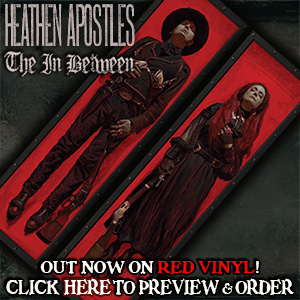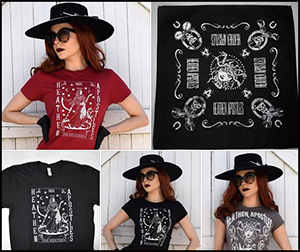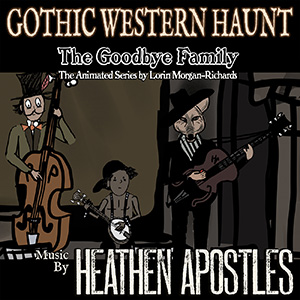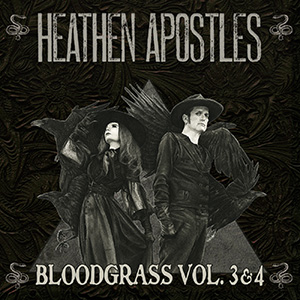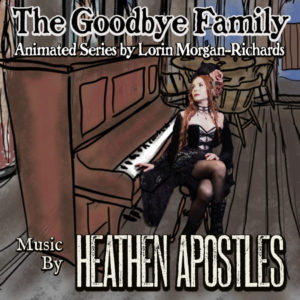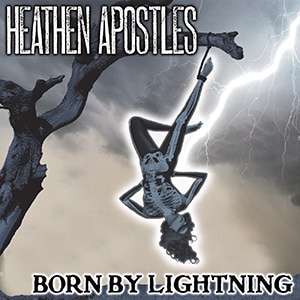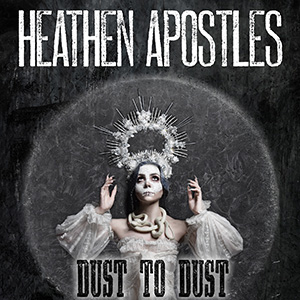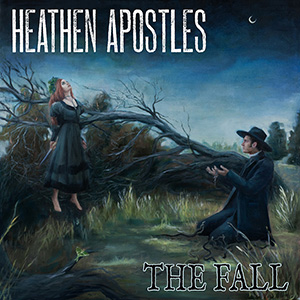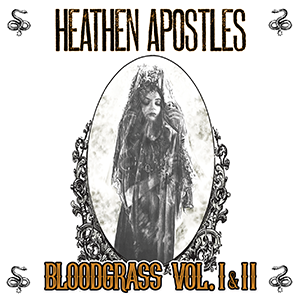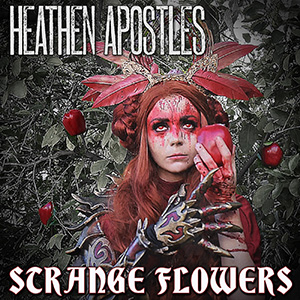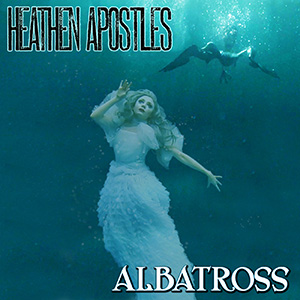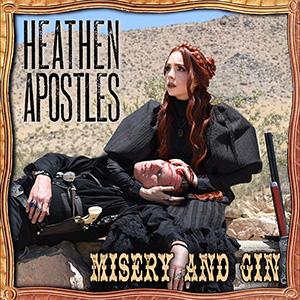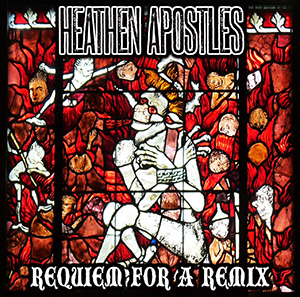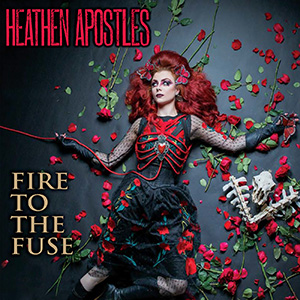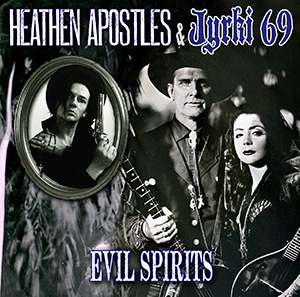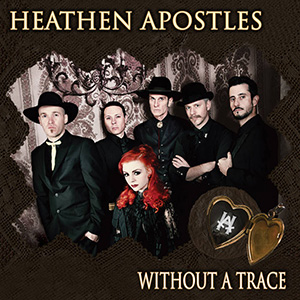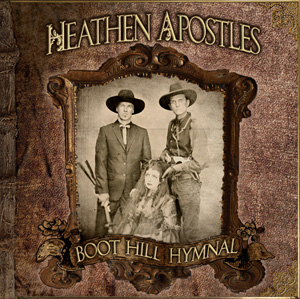Album Review – Darkest Country Music
Just six months in from the powerful impact of Chopper Franklin’s “Spaghetti Western Dub Vol. 1,” an album I’ve listened to heavily all year, I have to admit that I was already pining for more. The grit-drenched vibe was exactly what I had been ready for and in Mather Louth, I had discovered a vocalist who had jumped to the front of the queue of my favorites. The brassy, defiant timbre she brought to that album had me wanting more, and as if on cue, here is the follow up. This time it’s from the Heathen Apostles mothership from whence the Spaghetti Western Dub project launched. The band is fascinated by probing the very darkest Country music in a time when the genre is content to replicate the horror of The Eagles…with gated drums… and vague nods of a token slide guitar or a nasal-voiced singer as vestigial callbacks to actual Country music [Monk spits in dust]. That dreck is a far cry from what The Heathen Apostles serve up on their “lucky” seventh full length album, “The In Between.”

Double bass and mandolin allowed a spirited violin to flourish in the intro to the title track. Mather Louth showed here that she had what it took to be a classic Country vocalist even as distorted rock guitar from Chopper Franklin edged into the song following the middle eight, but the music bed here was mostly acoustic instruments. Luis Mascaro’s violin [you could call it a fiddle and I wouldn’t flinch] was just getting started in this program as his dexterous playing was adding substantial melodic filigree into the dusky fabric of the song.
As “Capital T” proved beyond the shadow of a doubt with its hoedown intro that had Mascaro leading the song by the nose with his busy violin. Ms. Louth was excoriating a guy who was definitely trouble and cut through his song and dance by claiming “don’t tell me that it’s wine and roses…what rose smells like that” in the vicious chorus. Making sure to bite down on the lyric hard when repeating it twice in the song’s climax as she snarled the lyric like a panther.
There was room for a little more Spaghetti Western goodness with “The Gods Of Men” with its stately march tempo and acoustic guitars. The violin was playing a textural role here, teaming with the banjo and mandolin as Ms. Louth proffered a delicate proclamation of the philosophical lyric.
Following a surprising lowing bass synthesizer, “Coffin For The Nail” featured a mournful duet of banjo and mandolin as Chopper and Mather joined in with their distorted voices. Circling each other like feral cats in a hellish call and response. Mather sounded like she was going for a vintage PJ Harvey meets Steve Albini vibe here with the fatalistic tune enlightened only by the violin snaking out of the dark heart of the song with a solo before the foreboding middle eight.
“Deama” began in a musically deceptive, almost genteel fashion, following the scorched earth of “Coffin For The Nail.” But as the song revealed its fatal payload with its tale of woman scorned, Ms. Louth erupted in an emphatic roar before the mandolin of Franklin and the fiddle of Mascaro carried the song to its climax. But Mather had the last word with her wordless expression vocal taking on an almost Arabic feel in the song’s coda.
The shifts of tempo that “In The Blood” brought to the table as the tune flip flopped from slower verses to a speedy chorus kept the variety coming throughout the program here. I loved how Ms. Louth added howls and yips following her belting of her vocal before the guitar solo on the middle eight.
The one cover here was a good one. The band managed to transform Mark Lanegan’s excellent “The Gravedigger’s Song” into something less extreme, and emphasized the dark beauty of the song by dialing down the aggro present in the original. Ms. Louth’s vocal here was gorgeous, complete with whispered contrapuntal vocals in French. Thematically, the song fit the album like a kidskin black leather glove. The tremolo violin added further delicate beauty here.
Mournful violin and banjo initially carried the elegant “Love Letter” forward but in the end it was the combination of the sensitive vocal of Mather and the flights of fancy taken by Mascaro’s violin that finished the job effectively. Following thunderstorm sound effects the album closed with the honky tonk piano jazz of “He Stood Tall,” courtesy of Greg Kuehn, The double bass of Thomas Lorioux grabbed some spotlight here as well with a walking bass line that added jaunt to the piano.
The album may be arguably slotted into Americana or even Gothic pigeonholes. The band certainly cut impressive figures in their ebony garb, but at the end of the day, when I hear an album with this much fiddle playing and no Irish accents, this signifies Country music to me. The good kind, with guts to spare and a willingness to color outside of the outlines to make a point or vary its attack. The album is released today and there is your choice of a DL for $7.00 in their Bandcamp store, but for just three dollars more, the $10.00 CD should be calling your name. The striking cover painting by Sean Cheetham is also available from the artist’s website as a large archival print, but the CD offers even more. The inner tray image features a Vince Ray illustration as well, as shown below. As ever, the band have cut deals with their supplier to have a low-cost international shipping option well below the normal price to sling a silver disc across the great expanse. That’s worth the love right there.

All this and Vince Ray, too
The Heathen Apostles are getting ready to cross the great expanse themselves with an extensive UK tour running through July and August where they will also be playing the famous Edinburgh Fringe Festival. Which will also host fine Alt Country from the beloved Countess Of Fife so I’m jealous of any Scottish readers who may attend. One hopes that they will check out each other’s set and contemplate a teamup! I’d pay good money for a song that featured both Mather Louth and Fay Fife.





